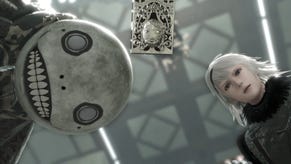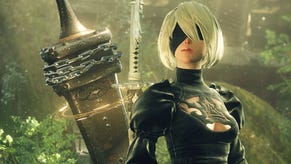Nier: Automata review
Machine with a dream.
If there was ever a game that didn't need a sequel it's Nier. The cult classic sci-fi fantasy fever dream by masked madman Yoko Taro did a lot to endear its niche but dedicated audience. Its peculiar blend of open-world adventure, hack-and-slash combat, and bullet hell shmups supplanted into a strange and harrowing world that refused to conform to usual sci-fi fantasy tropes was among the most audacious and surprising retail releases in ages. Yet as much as I adored Nier, it felt like a complete story. It had a beginning, middle and end. Then another end. And another.
It wasn't the most technically accomplished game, but its hodgepodge of influences blended together to make something wholly original. There's never been anything like it since. Until now.
The question, of course, is whether Taro would be able to make lighting strike twice. His follow-up to Nier, Drakengard 3, was a fascinating failure; a game with tremendous ideas and abysmal execution. With Bayonetta and Vanquish studio Platinum Games certainly there's promise of a more polished product (or at least a more refined combat system), but the concern remained that it might come at a cost. Would this big(ish) budget sequel to an aggressively off-kilter curio be too dumbed down? Too safe?
Long story short, it's not, though it may feel that way initially. Where Nier kicked off with the heartfelt story of a grizzled older man caring for his sick daughter (which, before The Last of Us, felt kind of novel), Nier: Automata's leads are harder to identify with. Set tens of thousands of years into the future, long past when Nier took place, Automata stars two stylish gothic androids, 2B (as in "or not to be") and 9S, who are just a couple of pawns in an endless war between man-made androids and alien-crafted machines. (Indeed, the fact that androids are machines does not go unnoticed.) 2B may be wearing a frilly getup, but her outlook initially comes across as distant and dull, while 9S's wide-eyed optimism seems a little hackneyed.
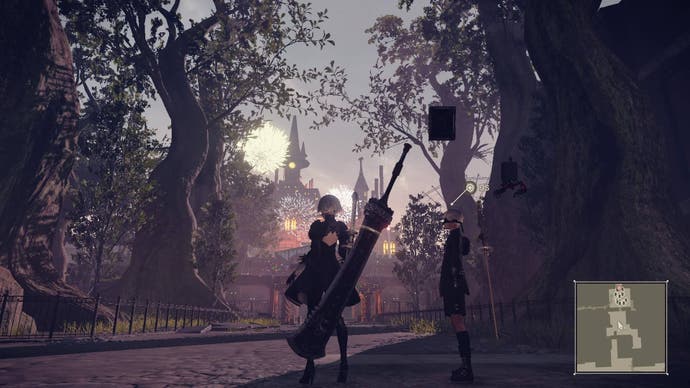
The early hours also dip heavily into Nier's well of motifs, which inherently feel less fresh a second time around. We've got another abandoned factory, another field grazed by boars, another desert wasteland, and a multitude of fun camera tricks that transform this open-world third-person adventure into a series of arcade mini-games. It's all well and good - and will certainly seem inventive for those who never played Nier - but these opening hours suggest a dispiriting return to Nier: it's bigger and smoother, but lacking the soul.
Stick with it, though, as what may initially seem like a return to the well gradually expands into something bold, ambitious, and surprising - even by the standards of its bonkers predecessor.
For the uninitiated, Nier and this sequel's biggest charms are predicated on a sense of surprise. The aesthetic style, mechanics, structure, and even UI are carefully crafted to ensure that the player is always engaging in something new. Where too many open world games start off strong but quickly peter out once the player has a handle on its core loop, Nier: Automata negates the whole idea of a loop entirely, ensuring that players don't become too complacent with its systems.
Even the most basic missions mix things up at an alarming rate. Ploughing through a factory overrun by renegade robots, you're sometimes hacking and slashing your way through a third-person action game, then you're engaged in a 2D side-on platformer, and suddenly you're thrust into a minimalist arcade twin-stick shooter for a dozen seconds. Even after 40 hours Nier: Automata is constantly throwing in quirky new surprises and secrets.
And that's just the mechanics! The real showstopper with Nier: Automata is its setting. An extraordinary ghost world where androids enact the will of humans while machines seemingly try to emulate them is filled to the brim with stories both big and small. There's the inhabitants of an abandoned amusement park who endlessly patrol its main avenue, adorned with enigmatic names like "Machine with a Dream"; a twisted cult of wayward robots panicking over a crisis of faith; and my favourite, the sand-swallowed derelict apartment dwellings now occupied by droids pantomiming cunnilingus, endlessly repeating "Love. Love. Love."
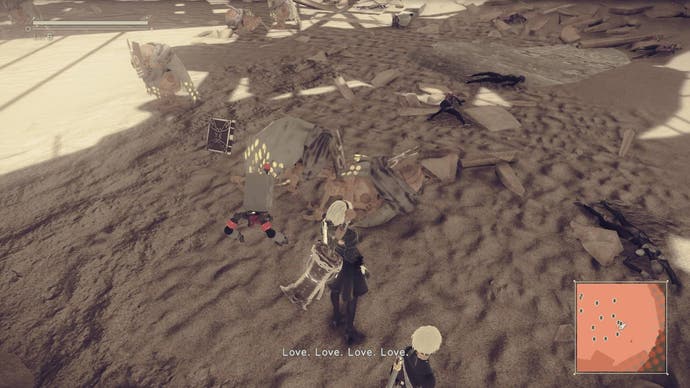
The art direction is every bit as inspired as these scenarios suggest, with truly wondrous vistas conveying a sense of ruined beauty. Factories are oppressive monuments to the industrial era, all rusted copper pipes and hazy grey skies. The machines offer an impressive range of form that all center around the same moonlike spherical noggins. The bosses too are memorable, offering a range of foes that vary from colossal metal monstrosities to androgynous human dopplegangers with a nihilistic sense of what makes one human.
Like the first Nier, the graphics can be a little lacking on a technical level with some muddy textures and craggy landscapes, but the sheer variety and scope of Nier: Automata's adventure more than makes up for its less stellar production values. Plus whatever detail is lacking in the scenery is more than made up for by composer Keiichi Okabe's marvelous soundtrack.
Taro and company wisely understand that the key to crafting such evocative worlds isn't in fleshing out the details, but rather in what it doesn't explain. Aside from a few clumsy pieces of dialogue here and there, Nier: Automata shapes its world through cryptic clues that only hint at cohesion. Taro is more interested in creating a sense of awe and intrigue rather than demystifying this convoluted tale of a world gone mad. This deliberate lack of exposition can make the plot hard to follow by the end, but this matters surprisingly little. You don't need to understand the specifics of how Nier: Automata's eclectic world hangs together to feel the crushing weight of its deranged AI denizens spiralling out of control.
When it comes to surprises, Nier: Automata simply never lets up. Taro has already stated in interviews that upon rolling credits in Nier: Automata, you've "not even seen half of the story." He's not wrong. Not since Castlevania: Symphony of the Night has a game so audaciously hidden away nearly half of its content behind a false ending. I'll try to stay spoiler-free here, suffice to say that Nier: Automata's New Game Plus offers a lot more changes than you'd expect, and - wink, wink - there's even more new content beyond that! A lot more. And it lays claim to some of the best moments in the entire series. In fact, I'd argue that the game only gets weirder and more interesting after the credits roll, though it's certainly no slouch before that.
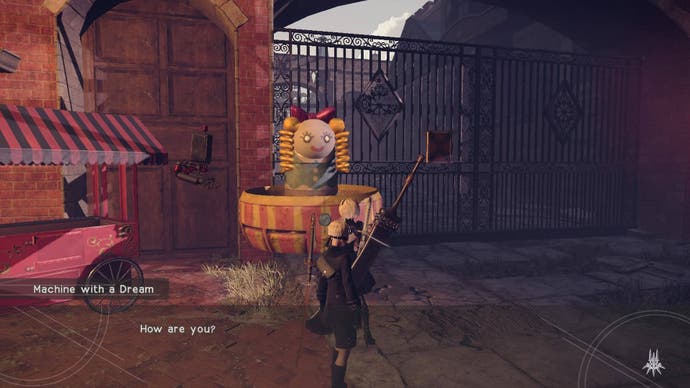
While Nier: Automata is filled to the brim with variety, it does come at a cost. The combat mechanics are definitely an improvement from its predecessor, but not up to Platinum's usual standards. Part of this is due to ambition - as noted above, Nier: Automata is a whole lot of genres rather than the more focused action affairs the Revengence studio typically pumps out - but the end result is feels looser and lacking in the precision we're used to from the studio behind Bayonetta.
Nier: Automata isn't the most elegant title on the market, but it's the most captivating game I've played in ages. You don't need to look far to find its glaring flaws, but those searching for an endlessly imaginative dreamlike journey will find Nier: Automata too mesmerising to look away from. There's nothing else quite like it - and that includes the original Nier.
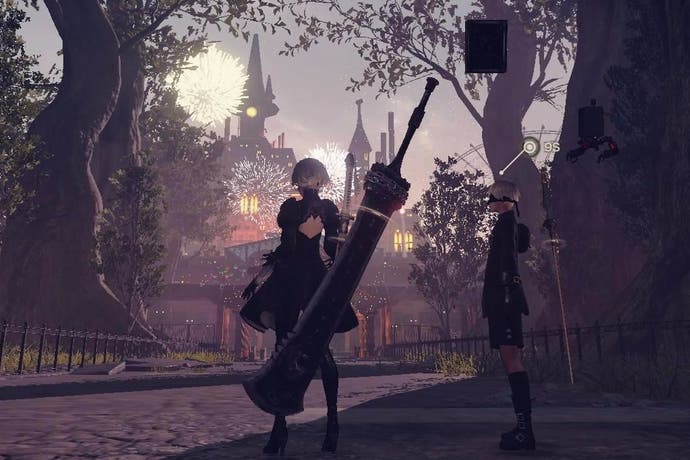


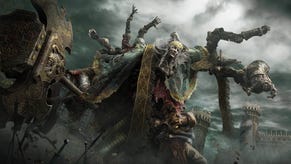
-0-0-screenshot.png?width=291&height=164&fit=crop&quality=80&format=jpg&auto=webp)
